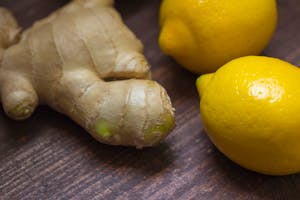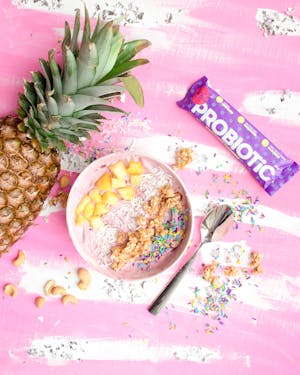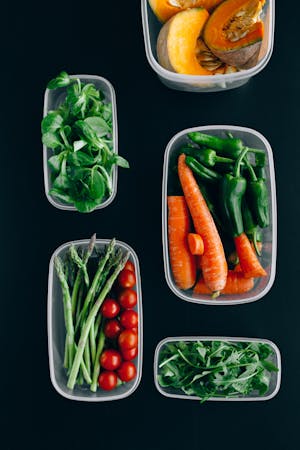Proven Natural Remedies to Improve Digestion: Soothe Your Gut Effortlessly

Feeling bloated, gassy, or constipated? These digestive woes are common. Natural remedies to improve digestion can help soothe your gut naturally.
Good digestion is fundamental to overall health, influencing everything from nutrient absorption and energy levels to immune function and even mood. While over-the-counter medications can offer temporary relief, many are seeking more sustainable and natural ways to improve digestion and cultivate a happy, healthy gut.
Affiliate Disclosure: This post contains affiliate links from Amazon Associates and ClickBank. As an Amazon Associate, I earn from qualifying purchases, and I may also earn commissions from ClickBank products at no extra cost to you. See our Affiliate Disclosure for more details.
1. Ginger: A Natural Remedy to Improve Digestion with Warming Spice

Ginger (Zingiber officinale) isn’t just a flavorful spice to liven up your meals; it’s a digestive powerhouse with a long history of use in traditional medicine for various gastrointestinal complaints. Its warming properties and potent bioactive compounds make it a go-to remedy for a multitude of digestive issues.
Why it Works for Digestion:
The magic of ginger lies in its active constituents, primarily gingerols and shogaols. These compounds exert several beneficial effects on the digestive system:
- 🌿Stimulates Digestive Enzymes: Ginger encourages the production of saliva and other digestive enzymes, which are crucial for breaking down food effectively.
- 🌿Accelerates Gastric Emptying: It can help speed up the rate at which food moves from the stomach into the small intestine. This can be particularly helpful for those who experience fullness or discomfort after eating.
- 🌿Anti-inflammatory Properties: Chronic inflammation can contribute to digestive problems. Ginger possesses potent anti-inflammatory effects that can soothe an irritated gut.
- 🌿Powerful Anti-Nausea Effects: Ginger actively reduces nausea and vomiting, whether from motion sickness, morning sickness during pregnancy (in moderation and after consulting a doctor), or post-surgery.
- 🌿Carminative Action: It helps to relax the muscles of the digestive tract, allowing trapped gas to pass more easily, thus reducing bloating and discomfort.
How to Use It:
Incorporating ginger into your routine is easy:
- 🌿Ginger Tea: Steep 2-3 thin slices of fresh ginger root (or ½ teaspoon of dried ginger powder) in hot water for 5-10 minutes. Add a squeeze of lemon or a touch of honey if desired. For a soothing option, I recommend this chamomile tea to pair with ginger for added digestive calm (As an Amazon Associate, I earn from qualifying purchases).
- 🌿Fresh in Meals: Add freshly grated or minced ginger to stir-fries, soups, smoothies, salad dressings, and marinades.
- 🌿Ginger Supplements: Capsules, chews, or tinctures are available for a more concentrated dose. Follow product instructions or consult a healthcare professional.
- 🌿Candied Ginger: Enjoy small pieces of candied ginger in moderation as a digestive aid after meals.
Important Note: While generally safe, ginger can interact with blood-thinning medications. If you are on such medication or have a bleeding disorder, consult your doctor before significantly increasing your ginger intake. Pregnant women should also consult their healthcare provider.
2. Peppermint: A Natural Remedy to Improve Digestion with Cooling Comfort

Peppermint (Mentha piperita) is another well-loved herb celebrated for its refreshing aroma and remarkable digestive benefits. Its cooling properties, primarily due to its active compound menthol, make it particularly effective for soothing certain types of digestive upset.
Why it Works for Digestion:
Peppermint’s digestive prowess stems mainly from menthol’s effects:
- 🌿Antispasmodic Action: Menthol has a relaxing effect on the smooth muscles of the gastrointestinal tract. This can help relieve spasms and cramps, which are common culprits in conditions like Irritable Bowel Syndrome (IBS).
- 🌿Carminative Properties: Like ginger, peppermint helps to expel gas, easing bloating and feelings of fullness.
- 🌿Stimulates Bile Flow: Some evidence suggests peppermint may stimulate the flow of bile, which aids in fat digestion.
How to Use It:
Incorporate peppermint into your routine for digestive relief:
- 🌿Peppermint Tea: A classic remedy. Steep fresh or dried peppermint leaves (or a tea bag) in hot water for 5-10 minutes. It’s a refreshing drink after meals.
- 🌿Enteric-Coated Peppermint Oil Capsules: These are specifically designed for individuals with IBS. The enteric coating allows the capsule to pass through the stomach intact and release the peppermint oil directly into the intestines, where it can exert its antispasmodic effects without aggravating potential heartburn.
- 🌿Peppermint Essential Oil (for external use): Dilute a few drops of peppermint essential oil in a carrier oil (like coconut or almond oil) and gently massage it onto your abdomen in a clockwise direction to help relieve gas and bloating. Never ingest undiluted essential oils.
Important Note: Peppermint can relax the lower esophageal sphincter (LES), the muscle that separates the esophagus from the stomach. For individuals with Gastroesophageal Reflux Disease (GERD) or frequent heartburn, peppermint tea might worsen symptoms. In such cases, enteric-coated capsules are often a better option if peppermint is being considered for IBS.
3. Probiotics: A Natural Remedy to Improve Digestion with Gut Balance

Your gut is home to trillions of microorganisms, collectively known as the gut microbiome. These bacteria, yeasts, and other microbes play a crucial role in digestion, nutrient absorption, immune function, and even mental health. Probiotics are live, beneficial microorganisms that, when consumed in adequate amounts, can help restore and maintain a healthy balance in your gut flora, making them one of the most effective natural remedies to improve digestion.
Why it Works for Digestion:
A balanced gut microbiome is essential for optimal digestion. Probiotics contribute by:
- 🌿Restoring Gut Flora Balance: Factors like stress, poor diet, antibiotics, and illness can disrupt the delicate balance of gut bacteria. Probiotics help replenish beneficial strains.
- 🌿Aiding Nutrient Breakdown and Absorption: Certain probiotic strains assist in breaking down food components that our bodies can’t digest on their own (like certain fibers) and enhance the absorption of essential nutrients.
- 🌿Producing Beneficial Compounds: Probiotics produce short-chain fatty acids (SCFAs) like butyrate, which nourish colon cells and have anti-inflammatory effects.
- 🌿Strengthening the Gut Barrier: A healthy gut lining prevents undigested food particles and toxins from leaking into the bloodstream. Probiotics help maintain the integrity of this barrier.
- 🌿Reducing Pathogenic Bacteria: Beneficial bacteria compete with harmful bacteria for resources, helping to keep their populations in check.
How to Use It:
Incorporate probiotics into your diet for better digestion:
- 🌿Fermented Foods: These are natural sources of probiotics. Include a variety in your diet:
- 🌿Yogurt: Choose plain, unsweetened varieties with “live and active cultures.”
- 🌿Kefir: A fermented milk drink, often more potent in probiotics than yogurt.
- 🌿Sauerkraut: Fermented cabbage (ensure it’s unpasteurized for live cultures).
- 🌿Kimchi: A spicy Korean fermented vegetable dish.
- 🌿Kombucha: A fermented tea beverage.
- 🌿Tempeh & Miso: Fermented soybean products.
- 🌿Probiotic Supplements: Available in capsules, powders, or liquids. Look for supplements with multiple strains, a high CFU (colony-forming unit) count, and consider strains clinically studied for your specific digestive concerns. I recommend this probiotic supplement(As an Amazon Associate, I earn from qualifying purchases).
Important Note: Introduce probiotic-rich foods or supplements gradually to allow your gut to adjust, as some people may initially experience mild gas or bloating. If you have a compromised immune system or a serious medical condition, consult your doctor before taking probiotic supplements. Since poor sleep can also disrupt gut health, check out our post on 5 Natural Remedies for Better Sleep for tips to improve your sleep and support digestion.
4. Hydration: The Essential Elixir for Smooth Digestion

It might seem simple, but adequate hydration is one of the most fundamental yet often overlooked aspects of good digestive health. Water is involved in nearly every step of the digestive process, making it one of the simplest natural remedies to improve digestion.
Why it Works for Digestion:
Water plays several vital roles in keeping your digestive system running smoothly:
- 🌿Softens Stool: Water combines with fiber in your colon to add bulk and softness to your stool, making it easier to pass and preventing constipation.
- 🌿Aids in Food Breakdown: Saliva, which is mostly water, begins the digestive process by moistening food and containing enzymes. Water is also essential for the production of other digestive juices.
- 🌿Facilitates Nutrient Absorption: Water helps dissolve nutrients from the food you eat, allowing them to be absorbed into your bloodstream.
- 🌿Supports Mucosal Lining: The lining of your entire digestive tract needs to stay moist and healthy to function properly and protect itself.
- 🌿Transports Waste: Water helps move waste products through your intestines and out of your body.
How to Use It:
Ensure you’re drinking enough water throughout the day:
- 🌿Drink Plenty of Water: The general guideline is about 8 glasses (64 ounces or about 2 liters) per day, but individual needs vary based on activity level, climate, and overall health. Listen to your body and drink when you’re thirsty.
- 🌿Hydrating Foods: Include fruits and vegetables with high water content in your diet, such as cucumbers, celery, watermelon, oranges, and strawberries.
- 🌿Herbal Teas: Non-caffeinated herbal teas (like chamomile, ginger, or peppermint mentioned above) also contribute to your daily fluid intake.
- 🌿Sip Throughout the Day: Don’t try to chug all your water at once. Sip consistently.
- 🌿Water with Meals: Sipping water during meals can aid digestion, but avoid drinking very large quantities immediately before or during a meal if you find it dilutes your digestive juices too much and causes discomfort.
Pro-Tip: Carry a reusable water bottle with you as a reminder to stay hydrated throughout the day.
5. Fiber-Rich Foods: Fueling a Happy Digestive System

Dietary fiber is the indigestible part of plant foods that plays a crucial role in digestive health. There are two main types of fiber, and both are important.
Why it Works for Digestion:
Fiber comes in two forms—soluble and insoluble—both of which benefit digestion:
- 🌿Soluble Fiber: Dissolves in water to form a gel-like substance in your digestive tract. This gel slows down digestion, which can help with blood sugar control and make you feel fuller for longer. It can bind to cholesterol, helping to lower LDL (“bad”) cholesterol levels. Importantly, it acts as a prebiotic, meaning it feeds the beneficial bacteria in your gut, promoting a healthy microbiome.
- 🌿Insoluble Fiber: Does not dissolve in water. It adds bulk to your stool and helps food pass more quickly through your stomach and intestines. This action is key for preventing constipation and maintaining regular bowel movements.
How to Use It:
Gradually increase your fiber intake to allow your digestive system to adjust and to avoid potential gas and bloating:
- 🌿Sources of Soluble Fiber: Oats, barley, apples, citrus fruits, carrots, peas, beans, lentils, psyllium husks, nuts, and seeds (like flax and chia).
- 🌿Sources of Insoluble Fiber: Whole grains (whole wheat bread, brown rice, quinoa), wheat bran, nuts, seeds, and the skins of many fruits and vegetables (like potatoes, apples, and cucumbers).
- 🌿Aim for Variety: Eat a wide range of fiber-rich foods to get the benefits of both types.
- 🌿Increase Water Intake: As you increase your fiber intake, it’s crucial to also increase your water intake. Fiber absorbs water, and without enough fluid, it can actually worsen constipation.
Pro-Tip: Start your day with a fiber-rich breakfast, like oatmeal with berries and nuts, or whole-grain toast with avocado. Read food labels to understand the fiber content of packaged foods. If you experience nerve-related digestive discomfort, such as from stress or neuropathy, consider Nerve Fresh, a top product for neuropathy support in 2025, which can complement these remedies by supporting nerve health (I may earn a commission from ClickBank).
Nurturing Your Digestion Naturally
Improving your digestion often involves a multifaceted approach. These five natural remedies to improve digestion – ginger, peppermint, probiotics, hydration, and fiber-rich foods – offer powerful and gentle ways to support your gut health. By incorporating them into your lifestyle, you can soothe discomfort, enhance digestive efficiency, and pave the way for better overall well-being. Since stress can also affect digestion, explore our 5 Natural Remedies for Stress Relief to find calm and support your gut health. For more wellness tips, visit our homepage at HealthEssentials.io.
Remember to listen to your body, introduce changes gradually, and be patient. Building a healthier digestive system is a journey, not a race.
Disclaimer:
This information is intended for educational purposes only and does not constitute medical advice. If you have persistent or severe digestive issues, or if you have any underlying health conditions or are taking medications, please consult with your healthcare provider to rule out any serious conditions and to determine the best course of action for your individual needs.
Here’s to a happier, healthier gut!
← Back to Blog
Comments are closed.